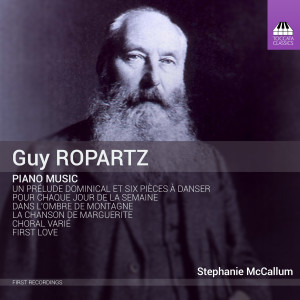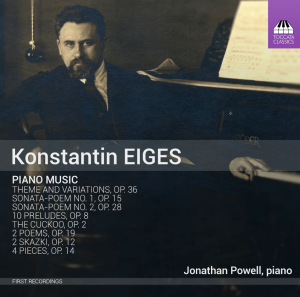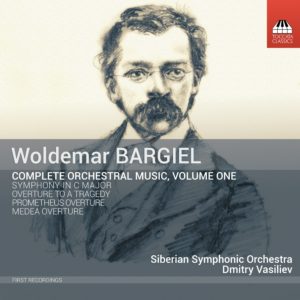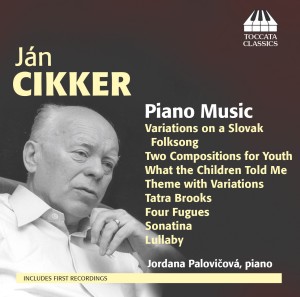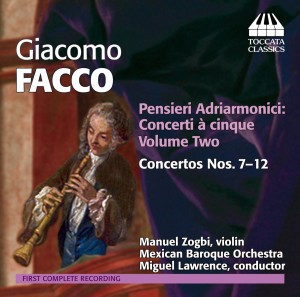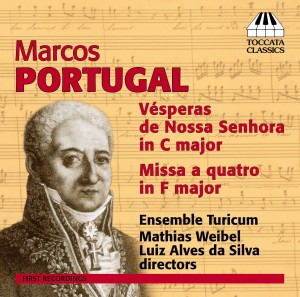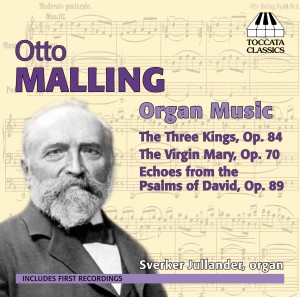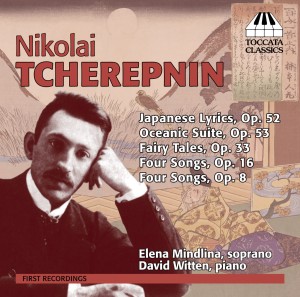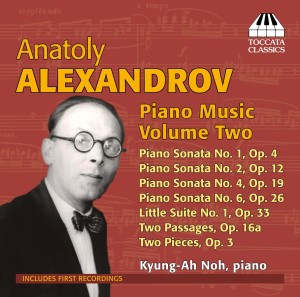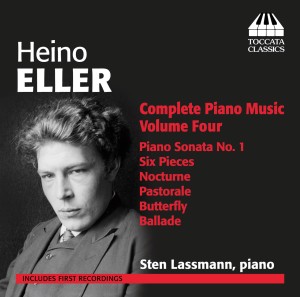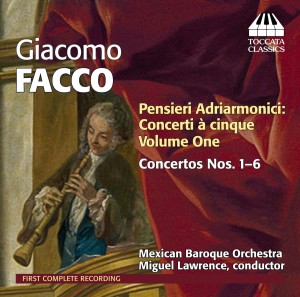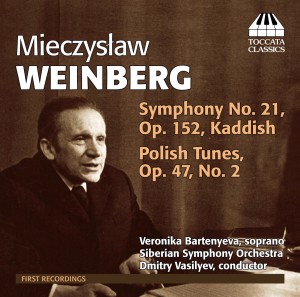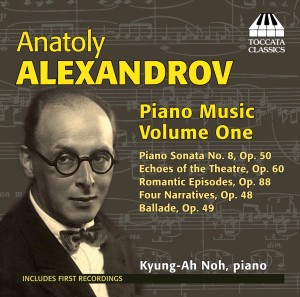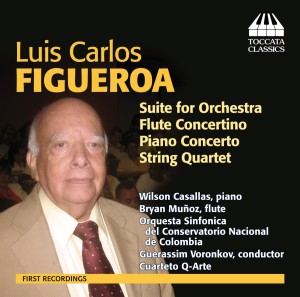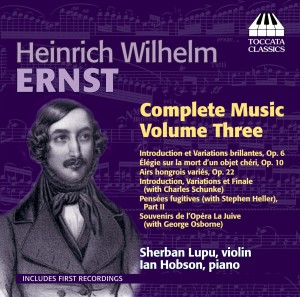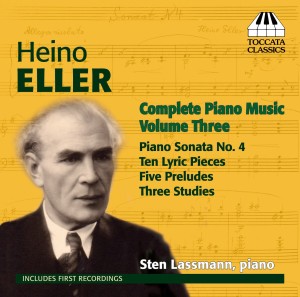Search Results for "obras de william makepeace thackeray" – Page 6
Showing results for operas william magpies teacher
Guy Ropartz: Piano Music
Guy Ropartz (1864–1955) was one of the unsung heroes of French music, often conducting the music of his contemporaries with his orchestra in Nancy. But Ropartz was a Breton, and his own music is impregnated with echoes of Breton folksong, which combines with the dignified manner inherited from his teacher, César Franck, and the delicate shades of Debussyan Impressionism, to create an atmospheric and attractive style, instantly recognisable as French.
Stephanie McCallum, piano
First recordings
Konstantin Eiges: Piano Music
Konstantin Romanovich Eiges (1875–1950), a member of a gifted Jewish family from eastern Ukraine, studied both in medicine and music in Moscow, but soon became known as an outstanding composer and pianist. His music bears the impress of Taneyev, his teacher, and of Skryabin and has points in common with his friends Medtner and Rachmaninov, but this first recording of his piano music reveals a figure who deserves to be remembered in his own right.
Jonathan Powell, piano
Woldemar Bargiel: Complete Orchestral Music, Volume One
Woldemar Bargiel (1828-97) was one of the best-known composers of his day, an important teacher and Clara Schumann's half-brother, but his music has been largely forgotten. His only symphony has a Beethovenian drive, and his three published orchestral overtures, which are symphonic poems in all but name, lie downstream from Schumann, with a Brahmsian weight and power.
Siberian Symphony Orchestra, Dmitry Vasilyev
Ján Cikker: Piano Music
Ján Cikker (1911-89) was one of the leading Slovak composers of the twentieth century, with no fewer than nine operas to his credit. Cikker was also a fluent pianist and his piano music — little known even in his native Slovakia (this disc features several first recordings) — sits downstream from Szymanowski and Janáček, similarly blending folk influences with an echo of French impressionism.
Jordana Palovičová, piano
Giacomo Facco: Pensieri Adriarmonici: Concerti à cinque, Volume Two
Giacomo Facco (1676-1753), born near Venice, was active in southern Italy as violinist, choirmaster and teacher before his appointment to the Spanish royal court around 1720. Although highly esteemed in his own time, Facco had disappeared from musical history until a set of his twelve Pensieri Adriarmonici — concertos for three violins, viola, cello and basso continuo — were discovered in a Mexican library in 1962. Bright and buoyant, they have much in common with the music of Vivaldi, Albinoni and Facco's other Venetian contemporaries — but are here given a distinct twist with a basso continuo of vihuela and guitarrón, as they might have been performed in eighteenth-century Mexico.
Manuel Zogbi, violin
Mexican Baroque Orchestra, chamber orchestra
Miguel Lawrence, director
Marcos António Portugal: Choral Music
The Portuguese-Brazilian composer Marcos António Portugal (1762-1830) was best known in his day for his fifty or so operas, but he also composed a huge body of more than 160 religious choral works. The two here — in their first performances in modern times — illustrate his conservative Classical style as well as the operatic influences on his sacred music, but the absence of female voices from the chorus and violins from the orchestra bring an unexpectedly dark colour.
Ensemble Turicum, ensemble
Mathias Weibel, director
Luiz Alves da Silva, director
Otto Malling: Organ Music
Otto Malling (1848-1915) was a central figure in Danish musical life, as composer, conductor, pianist, organist, administrator and teacher. His substantial output of organ music was cast in the form of suites of 'mood pictures' inspired by the Bible. The range of emotions it encompasses is correspondingly wide, from the languidly romantic to the fierily epic, in a language which is at all times dignified and direct.
Sverker Jullander, organ
Nikolai Tcherepnin: Songs
Nikolai Tcherepnin (1873-1945) — a student of Rimsky-Korsakov and teacher of Prokofiev — was a Russian-born composer and conductor, and the first of his family's musical dynasty. This CD provides an overview of his ninety-plus songs, which cover a wide range of styles. The early ones are in a late-Romantic idiom; the Japanese Lyrics of 1923 display oriental colours; and the extraordinary Oceanic Suite (1917-23), which sets a series of incantations by the symbolist poet Konstantin Balmont, presents modern evocations of primitive ritual.
Elena Mindlina, soprano
David Witten, piano
Anatoly Alexandrov: Piano Music, Volume Two
Anatoly Alexandrov (1888-1982) is one of the forgotten figures of the Russian school of pianism that embraced Taneyev, Rachmaninov, Skryabin, Shostakovich, Gilels and so many other composers and pianists. Alexandrov composed fourteen sonatas and much else for piano in an attractive late-Romantic style that owes much to Nikolai Medtner, his teacher and friend. The reviewer for MusicWeb International called Vol. 1 of this series a 'superb debut-disc' and commented that Kyung-ah Noh 'plays with immense power when called for, but is equally able to command the subtlest “pianissimo”.
Kyung-Ah Noh, piano
Heino Eller: Complete Piano Music, Volume Four
As both composer and teacher Heino Eller (1887-1970) was one of the founders of the classical tradition in his native Estonia. Yet his copious output for piano — some 200 works — is largely unknown, an omission this series of eight CDs seeks to redress. This fourth volume presents Eller's First Sonata, a Romantic work of gigantic proportions, composed for his final exam at the Petrograd Conservatory, as well as a number of miniatures, including one of his most popular pieces, Butterfly, and ends with the sage but passionate Ballade in C sharp minor from 1955.
Sten Lassmann, piano
Giacomo Facco: Pensieri Adriarmonici: Concerti à cinque, Volume One
Giacomo Facco (1676-1753), born near Venice, was active in southern Italy as violinist, choirmaster and teacher before his appointment to the Spanish royal court around 1720. Although highly esteemed in his own time, particularly as a composer of vocal music, Facco had disappeared from musical history until a set of his twelve Pensieri Adriarmonici — concertos for three violins, viola, cello and basso continuo — were discovered in a Mexican library in 1962. Bright and buoyant, they have much in common with the music of Vivaldi, Albinoni, Marcello and Facco's other Venetian contemporaries — but are here given a distinct twist with a basso continuo of vihuela and guitarrón, as they might have been performed in eighteenth-century Mexico.
Manuel Zogbi, violin
Mexican Baroque Orchestra, chamber orchestra
Miguel Lawrence, director
Mieczysław Weinberg: Music for Orchestra
Mieczysław Weinberg, born in Warsaw in 1919, became a close friend of Shostakovich in Moscow, after fleeing eastwards before the invading Nazis in 1939. His style has much in common with Shostakovich's: fluent contrapuntal skill, a keen feeling for melody, often inflected with Jewish cantilena, and an acute sense of drama which combines a natural narrative manner with an extraordinary ability to create atmosphere. Since his death in 1996, his vast output — which includes 26 symphonies, seven operas and seventeen string quartets — has enjoyed increasing recognition as some of the most individual and compelling music to have been composed in the twentieth century. This recording pairs an early orchestral work, the suite Polish Tunes of 1950, with the last full orchestral symphony he was to complete, dedicated to the memory of those who died in the Warsaw Ghetto.
Veronika Bartenyeva, soprano
Siberian Symphony Orchestra, orchestra
Dmitry Vasilyev, conductor
Anatoly Alexandrov: Piano Music, Volume One
Anatoly Alexandrov (1888-1982) is one of the forgotten figures of the Russian school of pianism that embraced Taneyev, Rachmaninov, Skryabin, Shostakovich, Gilels and so many other composers and pianists. Alexandrov composed fourteen sonatas and much else for piano in an attractive late-Romantic style that owes much to Nikolai Medtner, his teacher and friend. This first volume in the first-ever survey of his piano music presents a conspectus of works composed between 1939 and 1962.
Kyung-Ah Noh, piano
Luis Carlos Figueroa: Orchestral and Chamber Music
Luis Carlos Figueroa, born in 1923, is one of the senior figures in Colombian music, much esteemed as composer, pianist and teacher. His works marry spontaneous lyrical charm — perhaps with a French twist from his student days in Paris — with vibrant South American folk influences, thus siting him downstream from Canteloube and Villa-Lobos. His 1986 Piano Concerto, for example, combines rhythms from the Caribbean and the Valle del Cauca around his hometown of Medellin with classical forms and structures, creating a work full of passion and energy. The String Quartet is a first recording; the other works have not been released outside Colombia before.
Wilson Casallas, piano
Bryan Muñoz, flute
Orquesta Sinfónica del Conservatorio Nacional de Colombia, orchestra
Guerassim Voronkov, conductor
Cuarteto Q-Arte, string quartet
Heinrich Wilhelm Ernst: Complete Music, Volume Three
Heinrich Wilhelm Ernst (1812-65) was one of the leading musicians of his day, a friend of Berlioz, Chopin, Liszt and Mendelssohn, and for Joseph Joachim 'the greatest violinist I ever heard'. But the popular encore pieces by which Ernst is remembered today represent only a fraction of his output. This third CD — in a series of seven presenting all his compositions for the first time — shows the full range of his creativity and charm. The Élégie sur la mort d'un objet chéri is written in his most moving and melancholy vein, and the Airs hongrois variés push the virtuoso violin to its absolute limits. Between these extremes lie the lyricism of the Pensées fugitives, the inventiveness of his treatment of two Halévy operas and the high spirits of his fantasy on a Strauss waltz.
Sherban Lupu, violin
Ian Hobson, piano
Heino Eller: Complete Piano Music, Volume Three
As both composer and teacher Heino Eller (1887-1970) was one of the founders of the classical tradition in his native Estonia. Yet his copious output for piano — some 200 works — is largely unknown, an omission this series of seven CDs seeks to redress. The central works of Volume Three are the Ten Lyric Pieces, mirroring the tragic loss of Eller's Jewish wife, murdered during the Nazi occupation, and Fourth Sonata, a late masterpiece that sums up a life's work. The three Studies here offer a glimpse of Eller's early virtuosic pursuits, and the five Preludes showcase his endeavours in an expressionist idiom.
Sten Lassmann, piano
Stay In the Know
JOIN THE TOCCATA NEWSLETTER
"*" indicates required fields
By visiting our site, you agree to our privacy policy regarding cookies, tracking statistics, etc.
